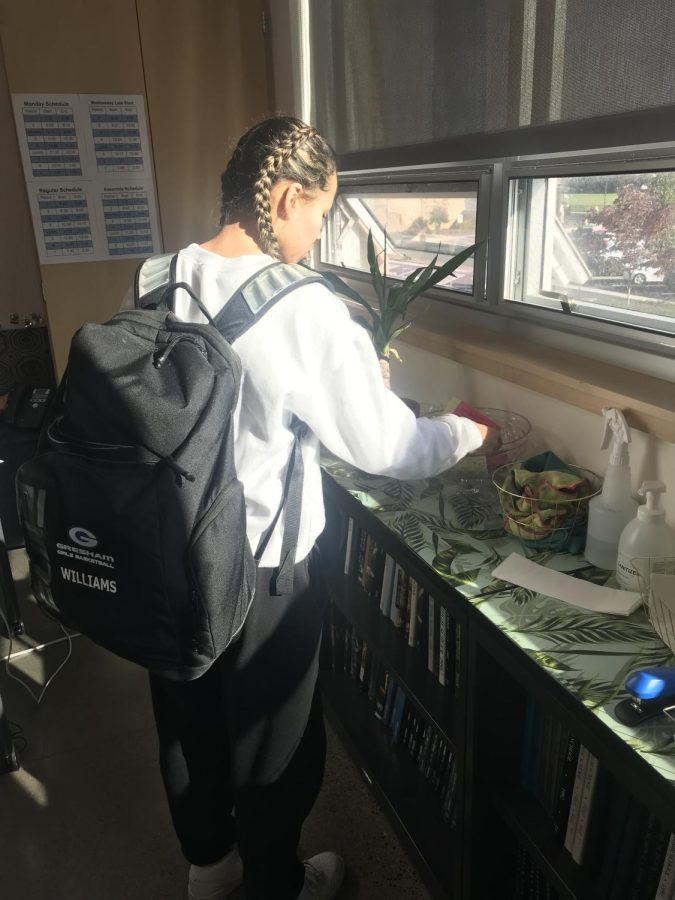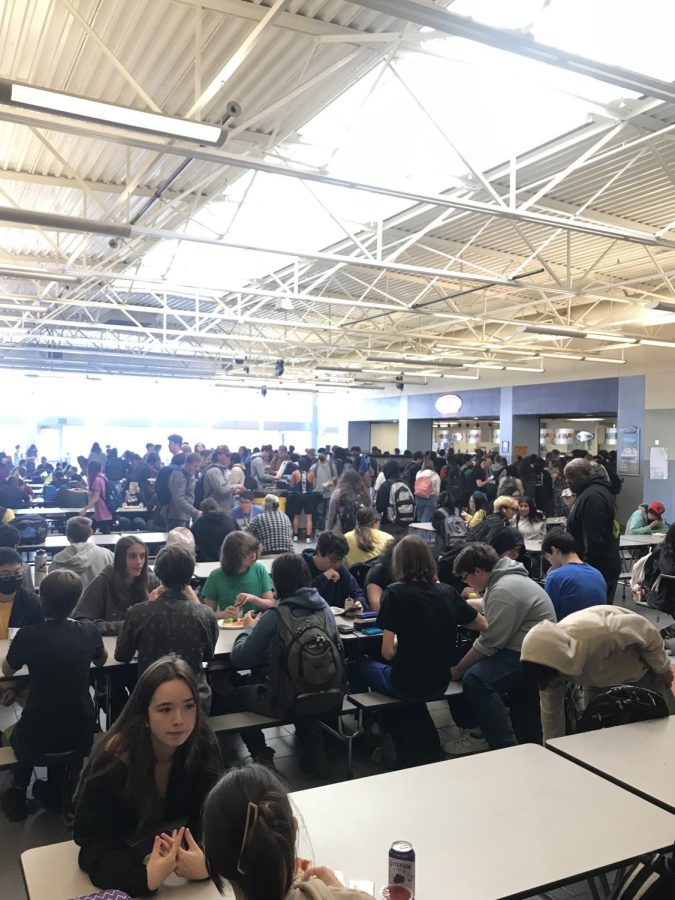 As the seasons change there is also a difference in people’s moods and how they feel emotionally. Some people (like me) love the fall, winter and spring seasons. The short, rainy days are perfect for cozying up with a cup of hot chocolate and reading a book. For others, the gloomy darkness causes a shift in mood.
As the seasons change there is also a difference in people’s moods and how they feel emotionally. Some people (like me) love the fall, winter and spring seasons. The short, rainy days are perfect for cozying up with a cup of hot chocolate and reading a book. For others, the gloomy darkness causes a shift in mood.
Last year, a student here suffered from seasonal depression, and I had the opportunity to witness how it impacted her daily life. Her story is just one of many here at Gresham High School and also of people all around the Northwest. While I have chosen to not share her name hopefully her story shall share both her strength and triumph and ideally that will inspire others to seek help or to talk to their loved ones about what they are going through.
Seasonal depression is characterized just like depression but only occurs during certain seasons, usually winter. This kind of depression is caused by the lack of sunlight (shortened days) which in turn affects how much serotonin (a chemical made by the brain that affects mood) is produced.
Unfortunately, this type of depression often goes unnoticed because it is not year round and often is not as severe as other forms of depression. This particular student seemed fine on the outside, but she was actually far from it. Under the surface, she felt alone and forgotten.
The weather here in Oregon causes us to have a higher rate of depression since we are so far from the equator, according to the National Alliance on Mental Illness’ website. The nasty weather made her feel terrible, gloomy and constantly cold.
Because of what she was going through she had to quit after school activities and her relationships crumbled. Her boyfriend broke up with her, and she often fought with her family. No one can blame themselves for what they could have done, but being able to identify signs of it can help us help each other.
Sometimes people can hide it very well. Even though this student did not feel like smiling, she forced herself to put on a happy face for others. Oftentimes, she would just blend into the background, unnoticed. She did not necessarily mean to, it just happened. Why? Was this on purpose? Or just a natural response? One of the only things that she felt good about was her grades. They were what kept her motivated, and she refused to let them fall.
After five long months, the depression finally began to fade, but that did not happen until she found someone to help her and the weather started to turn nicer. That person, another student here, had been going through a similar situation, so they could easily relate to each other. This is why talking to others can help. Sometimes opening up can lead to the realization that you are not alone in what you are experiencing and this can create a web of support through people that are going through similar things or people that can empathize with you.
The companionship they felt–and being able to share their troubles with each other– helped them cope with the depression they were dealing with. The sun was coming out more often and that helped brighten her mood as well.
This student was never officially diagnosed with seasonal depression, but she did exhibit all of the characteristics commonly associated with it. The school’s social worker, Kate Allen, was able to help her identify what was going on. This was done after a friend referred her to Allen.
So please, if you, or someone you know, is suffering from depression, seasonal or otherwise, I urge you to contact Kate Allen or one of the other school counselors, just like she did. Just talking to someone can sometimes be enough.
Even though we feel alone when we are going through a difficult situation, we are never alone. There are always others around us that can help us get through the rough patches. Then we can in turn give back to others when they struggling too.
Last year, a student here suffered from seasonal depression, and I had the opportunity to witness how it impacted her daily life. Her story is just one of many here at Gresham High School and also of people all around the Northwest. While I have chosen to not share her name hopefully her story shall share both her strength and triumph and ideally that will inspire others to seek help or to talk to their loved ones about what they are going through.
Seasonal depression is characterized just like depression but only occurs during certain seasons, usually winter. This kind of depression is caused by the lack of sunlight (shortened days) which in turn affects how much serotonin (a chemical made by the brain that affects mood) is produced.
Unfortunately, this type of depression often goes unnoticed because it is not year round and often is not as severe as other forms of depression. This particular student seemed fine on the outside, but she was actually far from it. Under the surface, she felt alone and forgotten.
The weather here in Oregon causes us to have a higher rate of depression since we are so far from the equator, according to the National Alliance on Mental Illness’ website. The nasty weather made her feel terrible, gloomy and constantly cold.
Because of what she was going through she had to quit after school activities and her relationships crumbled. Her boyfriend broke up with her, and she often fought with her family. No one can blame themselves for what they could have done, but being able to identify signs of it can help us help each other.
Sometimes people can hide it very well. Even though this student did not feel like smiling, she forced herself to put on a happy face for others. Oftentimes, she would just blend into the background, unnoticed. She did not necessarily mean to, it just happened. Why? Was this on purpose? Or just a natural response? One of the only things that she felt good about was her grades. They were what kept her motivated, and she refused to let them fall.
After five long months, the depression finally began to fade, but that did not happen until she found someone to help her and the weather started to turn nicer. That person, another student here, had been going through a similar situation, so they could easily relate to each other. This is why talking to others can help. Sometimes opening up can lead to the realization that you are not alone in what you are experiencing and this can create a web of support through people that are going through similar things or people that can empathize with you.
The companionship they felt–and being able to share their troubles with each other– helped them cope with the depression they were dealing with. The sun was coming out more often and that helped brighten her mood as well.
This student was never officially diagnosed with seasonal depression, but she did exhibit all of the characteristics commonly associated with it. The school’s social worker, Kate Allen, was able to help her identify what was going on. This was done after a friend referred her to Allen.
So please, if you, or someone you know, is suffering from depression, seasonal or otherwise, I urge you to contact Kate Allen or one of the other school counselors, just like she did. Just talking to someone can sometimes be enough.
Even though we feel alone when we are going through a difficult situation, we are never alone. There are always others around us that can help us get through the rough patches. Then we can in turn give back to others when they struggling too.
As the seasons change there is also a difference in people’s moods and how they feel emotionally. Some people (like me) love the fall, winter and spring seasons. The short, rainy days are perfect for cozying up with a cup of hot chocolate and reading a book. For others, the gloomy darkness causes a shift in mood.
Last year, a student here suffered from seasonal depression, and I had the opportunity to witness how it impacted her daily life. Her story is just one of many here at Gresham High School and also of people all around the Northwest. While I have chosen to not share her name hopefully her story shall share both her strength and triumph and ideally that will inspire others to seek help or to talk to their loved ones about what they are going through.
Seasonal depression is characterized just like depression but only occurs during certain seasons, usually winter. This kind of depression is caused by the lack of sunlight (shortened days) which in turn affects how much serotonin (a chemical made by the brain that affects mood) is produced.
Unfortunately, this type of depression often goes unnoticed because it is not year round and often is not as severe as other forms of depression. This particular student seemed fine on the outside, but she was actually far from it. Under the surface, she felt alone and forgotten.
The weather here in Oregon causes us to have a higher rate of depression since we are so far from the equator, according to the National Alliance on Mental Illness’ website. The nasty weather made her feel terrible, gloomy and constantly cold.
Because of what she was going through she had to quit after school activities and her relationships crumbled. Her boyfriend broke up with her, and she often fought with her family. No one can blame themselves for what they could have done, but being able to identify signs of it can help us help each other.
Sometimes people can hide it very well. Even though this student did not feel like smiling, she forced herself to put on a happy face for others. Oftentimes, she would just blend into the background, unnoticed. She did not necessarily mean to, it just happened. Why? Was this on purpose? Or just a natural response? One of the only things that she felt good about was her grades. They were what kept her motivated, and she refused to let them fall.
After five long months, the depression finally began to fade, but that did not happen until she found someone to help her and the weather started to turn nicer. That person, another student here, had been going through a similar situation, so they could easily relate to each other. This is why talking to others can help. Sometimes opening up can lead to the realization that you are not alone in what you are experiencing and this can create a web of support through people that are going through similar things or people that can empathize with you.
The companionship they felt–and being able to share their troubles with each other– helped them cope with the depression they were dealing with. The sun was coming out more often and that helped brighten her mood as well.
This student was never officially diagnosed with seasonal depression, but she did exhibit all of the characteristics commonly associated with it. The school’s social worker, Kate Allen, was able to help her identify what was going on. This was done after a friend referred her to Allen.
So please, if you, or someone you know, is suffering from depression, seasonal or otherwise, I urge you to contact Kate Allen or one of the other school counselors, just like she did. Just talking to someone can sometimes be enough.
Even though we feel alone when we are going through a difficult situation, we are never alone. There are always others around us that can help us get through the rough patches. Then we can in turn give back to others when they struggling too.





